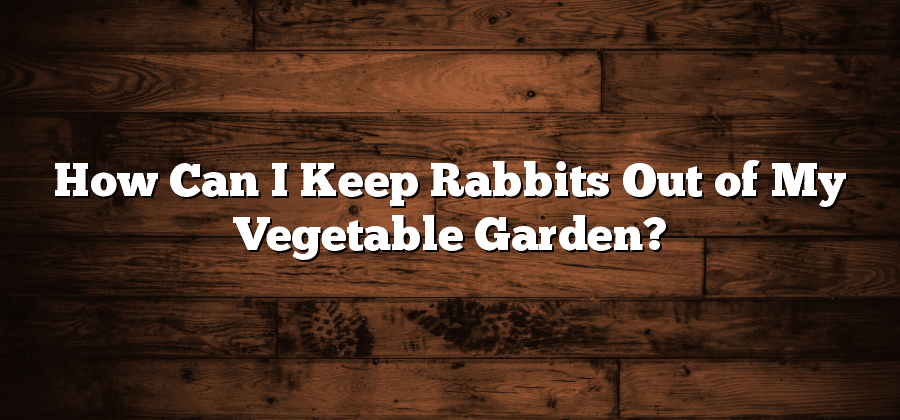Understanding the Habits and Behaviors of Rabbits
Rabbits are small, furry mammals known for their ability to reproduce quickly and their affinity for gardens. Understanding their habits and behaviors can help gardeners effectively manage and prevent rabbit damage.
One important habit to note is that rabbits are most active during dawn and dusk, preferring to rest during the heat of the day and the darkness of the night. They are herbivores, with a primary diet consisting of grasses, clovers, and leafy vegetables. Due to their constant need to graze, rabbits can quickly decimate a garden if left unchecked. They are agile and quick, with the ability to hop and sprint to escape from predators. Additionally, rabbits are known for their digging behavior, creating burrows and tunnels to seek shelter and protection.
Identifying Common Signs of Rabbit Presence in Your Garden
Rabbits are notorious for their ability to wreak havoc in gardens, often leaving behind obvious signs of their presence. One of the most common signs to look out for is damage to plants and vegetation. Rabbits have a voracious appetite and will often chew through leaves, stems, and flowers, leaving behind ragged edges or completely destroyed plants. This is especially prevalent in the early morning or evening when rabbits are most active.
Another telltale sign of rabbit presence is the presence of small, pellet-like droppings scattered throughout your garden. These droppings are usually dark in color and resemble small, round pellets. Rabbit droppings are a useful indicator of their activity as they are often found in concentrated areas where rabbits feed or rest. Keep an eye out for these droppings near damaged plants or along known rabbit paths.
Implementing Physical Barriers to Prevent Rabbit Access
Physical barriers are an effective and practical solution for preventing rabbits from accessing your garden. One popular option is the use of wire mesh fences, which can be easily installed to create a reliable barrier. It is important to choose a mesh size that is small enough to prevent rabbits from squeezing through, typically no larger than 1 inch by 1 inch. Additionally, burying the bottom of the fence at least 6 inches into the ground will prevent rabbits from burrowing underneath. Remember to secure the fence tightly to ensure that rabbits cannot push their way through any loose areas.
Another method for implementing physical barriers is the use of chicken wire or hardware cloth to protect individual plants or flower beds. This can be particularly useful for smaller areas that are vulnerable to rabbit grazing. Simply wrap the wire around the designated area, creating a barrier at least 2 feet high to discourage rabbits from reaching over it. Be sure to secure the wire tightly and bury the bottom into the ground to prevent rabbits from digging under. Although this method may require more effort and maintenance, it provides targeted protection for specific plants or areas that are at risk.
Choosing and Installing Rabbit-Proof Fencing
When it comes to protecting your garden from rabbits, choosing and installing rabbit-proof fencing is a crucial step. The right fencing will help keep these pesky critters out and ensure your plants remain undisturbed.
First, carefully consider the material of the fencing. For effective rabbit-proofing, it is recommended to opt for a wire mesh fence with small openings. This will prevent rabbits from squeezing through and gaining access to your garden. Additionally, choose a fence height that is at least three feet tall to deter rabbits from jumping over. It is important to secure the bottom of the fence by burying it a few inches deep or attaching it to a solid base to prevent rabbits from burrowing underneath.
Installing the rabbit-proof fencing requires careful planning and execution. Begin by determining the perimeter of your garden that needs to be fenced. Clear any existing vegetation or obstructions that may interfere with the installation. Place stakes at regular intervals along the perimeter to mark where the fencing will be installed.
Next, unroll the wire mesh fencing, ensuring it reaches the desired height and is securely attached to the stakes. Consider adding additional support by attaching the top of the fence to horizontal wires or wooden posts. This will provide extra stability and prevent rabbits from pushing or bending the fence. Finally, inspect the entire fence to ensure there are no gaps or loose spots that rabbits could exploit.
By following these guidelines and selecting the appropriate fencing material, you can effectively create a rabbit-proof barrier that will safeguard your garden and prevent any unwelcome visitors.
Utilizing Natural Deterrents to Repel Rabbits
Rabbits can be persistent pests when it comes to wreaking havoc in your garden. If you prefer a more natural approach to deterring these furry intruders, there are several options you can explore. One such option is using strong-smelling plants as natural deterrents. Rabbits typically have a strong sense of smell and are deterred by certain odors. Planting herbs like lavender, thyme, or sage can help keep rabbits away as they are not fans of these scents. Additionally, spreading dried predator urine or sprinkling cayenne pepper around your garden can also act as natural repellents, as rabbits find these odors offensive.
Another method to consider is using natural barriers to keep rabbits at bay. Raised beds, for example, can make it more difficult for rabbits to access your plants and can provide an effective deterrent. Utilizing mulch made from materials that rabbits dislike, such as pine needles or cedar chips, can also help protect your garden. Another idea is to create noise or movement in your garden. Placing wind chimes or installing a motion-activated sprinkler system can startle and discourage rabbits from getting too close. By employing these natural methods, you can enjoy your garden without having to worry about rabbits feasting on your hard work.






